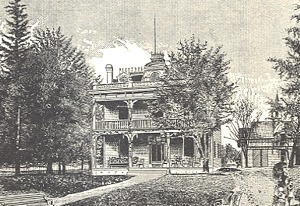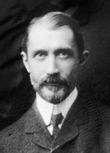|
The residence next to be described is located a few hundred feet back from the lake, and is partly concealed by a beautiful group of evergreens. It is known as "The Pines," and includes a picturesque little ravine which is crossed by several rustic bridges. The majestic old trees and velvety lawn indicate an occupancy of many years. The grounds, consisting of some thirty-five acres, were laid out and the present residence erected by Edmund A. Brush, who from 1857 to 1877, with his family, made a practice of spending summer at the Pointe. They were the first Detroiters who settled here. To him, and to his wife, Eliza Cass Hunt, daughter of Gen. John E. Hunt, and niece of Gen. Cass, no other summer resort possessed equal attraction.
 Here their five children, Edmund Erskine, Adelaide, Lillie, Alfred E., and Elliot Hunt, passed their childhood. Mr. E. A. Brush died in 1877, having survived all of his children except Alfred E. Brush, who, with his mother, his wife Rowena Hunt Brush, and his infant daughter, Virginia Eloise, occupy the residence. Here their five children, Edmund Erskine, Adelaide, Lillie, Alfred E., and Elliot Hunt, passed their childhood. Mr. E. A. Brush died in 1877, having survived all of his children except Alfred E. Brush, who, with his mother, his wife Rowena Hunt Brush, and his infant daughter, Virginia Eloise, occupy the residence.
Alfred E. Brush, as the only male representative, necessarily largely occupied with the care of the landed interests of the family. A prominent member of the Detroit and Grosse Pointe Clubs, a devotee of fishing and shooting, the best shot at the Pointe, a gentleman of education and fine social qualities, he worthily represents one of the oldest and wealthiest families in the city. He graduated from the University of Ann Arbor in the class of 1873.
At the time of his death, Mr. Brush had one grand-daughter, Lillie E., the child of his daughter, Adelaide and William G. Thompson, former mayor of Detroit. Mrs. Thompson died some years before her father, and Mr. Thompson then married Adele Campau, daughter of the late Daniel J. Campau.
Col. Elijah Brush, the father of E. A. Brush, was prominent in the early history of Detroit, having been commander of the Legionary Corps in the war of 1812. He was a lawyer by profession, a graduate of Dartmouth College, and an early member of the famous Marietta Colony. He subsequently removed to Michigan, and became the first Attorney General of the Territory. Here he married Adelaide, daughter of John Askin, Esq., and Marie Archange Barthe -the latter a member of one of the oldest French families settled at Detroit. The Askins (originally Erskine), were at an early day wealthy and influential citizen. Through his connection with this family, Col. Brush came into possession of the Askin or Brush farm, lying adjacent to old Fort Pontchartrain, and now dividing the city of Detroit nearly in the center.
E. A. Brush was born in 1802, and died in his 75th year. He graduated at Hamilton College and was admitted to the bar, but never entered on general practice as his time was occupied in the care of the large estate left by his father. While still a young man, he accompanied Gen. Cass in his famous canoe expedition for the exploration of the upper lakes. On his return he was called to a number of prominent municipal offices, and aided in securing the construction of several of the railways leading into Detroit.
His French descent made him a great favorite with that nationality. He spoke their language fluently and, fortunately for his descendants, preserved with French tenacity his landed estate, and now the Brush farm is the most valuable property in the city.
The modest cottage of Cleaveland Hunt comes next to view. The occupant has been, for many years, one of Detroit's best known lawyers. A descendant of one of the old families, and occupying a prominent social position, he found pleasant companionship at the Pointe for many summers, but since the death of his only daughter, a few years ago, he has not occupied the place. His wife, who died some time previously, was a sister of Mrs. James McMillan. His only remaining child, Wetmore Hunt, who married Isabella Ker Muir, now occupies the cottage.
|